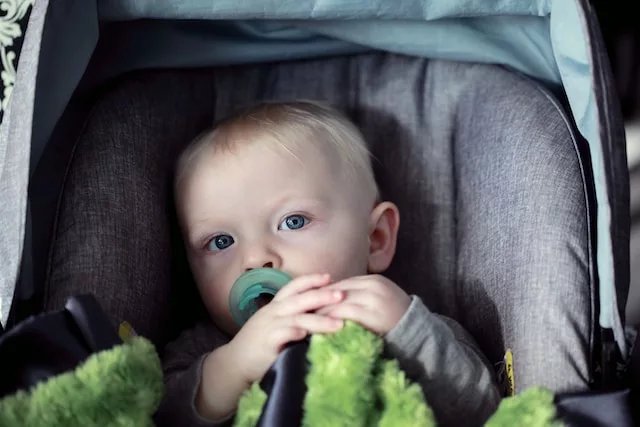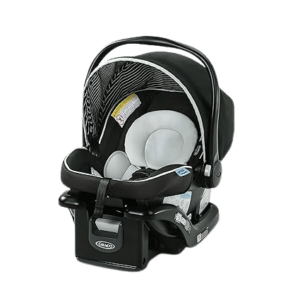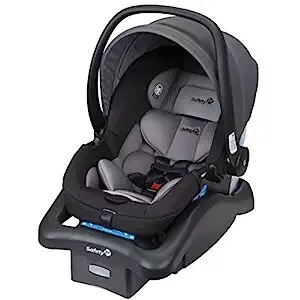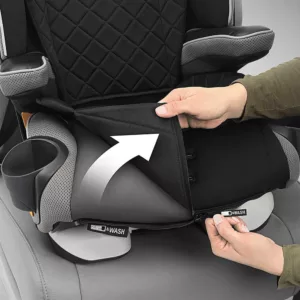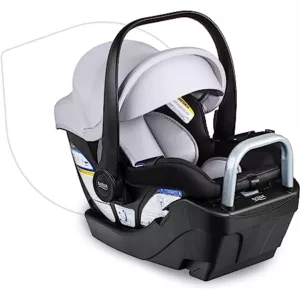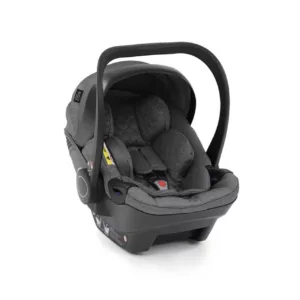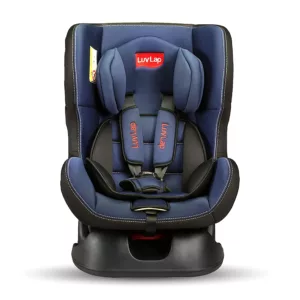Car Seats Expire – Learn about child car seat lifespan & the importance of adhering to safety limits.
Thank you for reading this post, don't forget to subscribe!As parents, we prioritize our children’s safety during car rides and carefully select car seats that meet safety standards. But have you ever wondered why car seats expire? In this article, we’ll explore the reasons behind the expiration dates of baby car seats and shed light on the child car seat lifespan. Join us as we uncover the hidden lifespan of car seats and their implications for your child’s safety.
Car Seats Expiration – Reasons Behind the Car Seat Expirations
Table of Contents
ToggleUnderstanding why car seats expire is essential for safeguarding our little ones and making informed decisions when it comes to their safety on the road. So let’s embark on this journey to discover the reasons behind the car seats expirations:
Evolving Safety Standards – Baby Car Seat Safety
Safety regulations for car seats constantly evolve, prompting manufacturers to enhance design, materials, and construction to meet the latest standards. Expiration dates ensure that parents use seats that adhere to updated safety guidelines, providing optimal protection.
Weathering Time’s Effects
Car seats endure wear and tear from regular use, exposure to sunlight, temperature changes, and minor accidents. Over time, straps may stretch, padding may deteriorate, and components may weaken. Expiration dates prevent the use of compromised seats that may fail to provide adequate protection in collisions.
Car seat designs continuously improve with advanced safety technologies. Expiration dates encourage parents to upgrade to newer models incorporating the latest safety advancements, ensuring better protection for their child.
Product Liability and Recalls
Expiration dates help manufacturers manage product liability and issue recalls if safety concerns arise. Using an expired car seat may pose risks and complicate insurance coverage or legal matters.
Compatibility with Regulations – Baby Car Seats Expire
Car seat expiration dates ensure compliance with safety regulations specific to each country. By adhering to expiration dates, parents can ensure their car seats meet the latest safety guidelines.
Do Manufacturers Have to Provide Car Seats Expiration Dates on Baby Car Seats? – Understanding Car Seat Expiry
Are manufacturers required to include car seats expiration date? Let’s explore the facts. In this article, we’ll uncover whether there is a legal obligation for manufacturers to disclose an expiration date on baby car seats.
While safety standards exist for baby car seats, there is no universal requirement for manufacturers to include an expiration date. Instead, manufacturers must meet specific safety criteria during the car seat’s usable lifespan. The inclusion of an expiration date is often voluntary and implemented to align with evolving safety standards.
Although not mandatory, manufacturers often choose to provide expiration dates to manage their product liability and promote consumer awareness. By specifying an expiration date, manufacturers can define a timeframe within which the car seat is expected to perform optimally. This practice also educates caregivers on the importance of regularly assessing and replacing car seats for ongoing safety.
Is it Illegal to Use Expire Car seat?
While safety standards exist for baby car seats, there is no universal requirement for manufacturers to include an expiration date. Instead, manufacturers must meet specific safety criteria during the car seat’s usable lifespan. The inclusion of an expiration date is often voluntary and implemented to align with evolving safety standards.
Although not mandatory, manufacturers often choose to provide expiration dates to manage their product liability and promote consumer awareness. By specifying an expiration date, manufacturers can define a timeframe within which the car seat is expected to perform optimally. This practice also educates caregivers on the importance of regularly assessing and replacing car seats for ongoing safety.
Using an expired car seat can be considered illegal or unsafe in many places. The legality of using an expired car seat depends on the laws and regulations of the specific country or region. In general, car seat manufacturers put expiration dates on their products for safety reasons. Over time, the materials in the car seat can degrade due to factors like temperature changes, sunlight exposure, and general wear and tear, which can compromise its effectiveness in protecting a child during a crash.
In some countries, such as the United States and Canada, while there may not be explicit laws stating that using an expired car seat is illegal, it is strongly advised against by safety organizations and child passenger safety technicians. The expiration date is usually found on the car seat itself, often stamped on the base or the back, and it’s typically about six years after the manufacturing date. However, this can vary by brand and model.
If you’re using an expired car seat, it’s important to consider the safety risks. In the event of an accident, an expired car seat may not provide the necessary protection to your child, which could have legal consequences if it’s found to have contributed to any injury. It’s always best to follow the manufacturer’s guidelines and replace car seats as recommended.
Do Car Seat Bases Expire?
Yes, car seat bases do expire, just like the car seats themselves. The expiration date is usually based on the date of manufacture and is meant to ensure that the base maintains its structural integrity and reliability over time.
The materials used in car seats and bases, such as plastic and other components, can degrade over time due to factors like temperature fluctuations, exposure to sunlight, and general wear and tear. This degradation can potentially affect the base’s ability to safely secure the car seat in the event of a collision.
The expiration date for a car seat base is often found on the base itself, either stamped into the plastic or on a label. The typical lifespan of a car seat base is usually around six to ten years from the date of manufacture, but this can vary depending on the manufacturer and model.
It’s important to adhere to these expiration dates for safety reasons. Using an expired car seatbase can put a child at risk in the event of a car accident. Always check the manufacturer’s instructions and labels on the car seat and base for specific expiration information and replace them when they reach their expiration date.
Where to Find the Expiration Date? Car Seat Degradation Over Time
The expiration date of a baby car seat can typically be found in one of the following places:
- Manufacturer’s Label
- Owner’s Manual
- Product Packaging
- The manufacturer’s website
Manufacturer’s Label

Check the bottom or back of the car seat for a label or sticker provided by the manufacturer. This label often includes important information, such as the manufacture date, model number, and expiration date.
Owner’s Manual
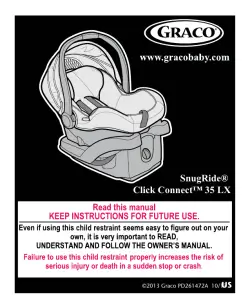
Refer to the car seat’s owner’s manual, which usually contains detailed information about the product, including the expiration date. Look for a dedicated section or search for keywords like “expiration” or “lifespan” within the manual.
Product Packaging
If you still have the original packaging, the expiration date may be indicated on the box or packaging materials. Check for any printed or attached labels that mention the expiration date.
Online Resources
In some cases, the manufacturer’s website may provide information on the expiration date of their car seats. Visit the manufacturer’s official website and search for the specific model or product to find any available details regarding the expiration date.
Understanding Car Seat Lifespan – Expired Car Seat Dangers
Baby car seats typically last between 6 and 10 years, but factors like expiration dates, wear and tear, evolving safety standards, and technological advancements influence their lifespan.
Regular inspection and staying updated on safety standards are essential to ensure ongoing safety.
Could Using an Expired Car Seat Land You in Trouble? – Importance of Car Seat Expiration
As vigilant parents, we strive to provide the best protection for our little ones during car rides. But what happens if you unknowingly use an expired car seat? Could you face consequences for this innocent oversight?
Using an expired car seat can potentially lead to various consequences. Let’s explore them in an engaging manner:
Compromised Safety – Baby Car Seats Expire
The primary concern with using an expired car seat is compromised safety for your child. Over time, car seats undergo wear and tear, rendering them less effective in protecting your little one during an accident or sudden jolt. The expiration date serves as a reminder to replace the seat and ensure your child’s safety remains a top priority.
Insurance and Liability – Why do Baby Car Seats Expire?
In the unfortunate event of an accident, insurance companies and legal entities may scrutinize the condition of the car seat. If it is discovered that you were using an expired car seat, it could potentially impact your insurance coverage or even lead to liability concerns. Insurance companies may argue that you did not take appropriate measures to ensure your child’s safety, which could complicate matters in the event of a claim.
Legal Violations – Baby Car Seats Expire
While the specific legal implications of using an expired car seat vary by jurisdiction, some areas have laws in place to enforce the use of up-to-date car seats. Violating these laws could result in fines, penalties, or even legal consequences, depending on the severity of the violation. It is crucial to familiarize yourself with the laws and regulations in your jurisdiction to avoid potential legal troubles.
Public Perception and Social Responsibility – Why Do Baby Car Seats Expire?
Using an expired car seat may also attract public attention or raise concerns within your social circle. In a world where child safety is a significant concern, others may question your judgment or level of responsibility as a caregiver. Demonstrating a commitment to safety and adhering to recommended guidelines can help maintain your reputation as a responsible parent.
While it may not be a criminal offense to use an expired car seat in most jurisdictions, the potential risks and consequences should not be overlooked. The foremost concern is your child’s safety, as an expired car seat may compromise their protection during a car ride. Additionally, insurance complications, legal violations, and social perceptions are important factors to consider. It is always advisable to replace your car seat promptly once it reaches its expiration
Is it Recommended Using Second-Hand Car Seats? – Navigating the Safety Roadmap | Baby Car Seats Expire
When it comes to the safety of our precious little ones, choosing the right car seat is paramount. But what about second-hand car seats? Are they viable options or potential risks? Buckle up as we navigate the safety roadmap and unravel the pros, cons, and essential guidelines for making an informed decision about using a second-hand baby car seat:
| PROS | CONS |
|---|---|
| Second-hand car seats are more affordable than purchasing new ones, making them a budget-friendly option. | Second-hand car seats may have an unknown history, including potential involvement in accidents or improper use. |
| Second-hand car seats provide a wider range of options, including discontinued or rare models that are no longer available in the market. | Used car seats may exhibit more wear and tear due to previous use, potentially affecting their safety and effectiveness. |
| Reusing second-hand car seats reduces waste and lessens the environmental impact associated with manufacturing new products. | Older models may not meet current safety standards and may lack the latest advancements in safety technology. |
What are the International Variances in Car Seats’ Expiration Dates? – Baby Car Seats Expire
Safety regulations specific to baby car seats vary in different countries, including understanding car seat expiry. It’s essential for parents to familiarize themselves with the regulations and guidelines established by their country’s regulatory authorities. One crucial aspect is understanding car seat expiry. By understanding car seat expiry according to International variances, parents can ensure they are using a car seat that meets the current safety standards.
Safety regulations specific to baby car seats in different countries vary:
United States – Baby Car Seats Expire
- In the United States, the National Highway Traffic Safety Administration (NHTSA) sets safety standards and regulations for car seats.
- Car seats must meet Federal Motor Vehicle Safety Standard (FMVSS) 213, which includes criteria for crash testing, labeling, and other safety requirements.
European Union – Baby Car Seats Expire
- In the European Union, car seats must comply with the United Nations ECE R44/04 or the newer i-Size regulation (UN R129).
- The ECE R44/04 standard specifies requirements for safety, testing, labeling, and installation of car seats, while the i-Size regulation focuses on height-based car seats and Iso fix installation.
Canada – Baby Car Seats Expire
- Transport Canada sets regulations for car seat safety, including compliance with the Canada Motor Vehicle Safety Standards (CMVSS).
- Car seats must meet specific requirements outlined in CMVSS 213, which cover various aspects such as design, construction, labeling, and testing.
Australia – Baby Car Seats Expire
- In Australia, car seats must adhere to the Australian/New Zealand Standard AS/NZS 1754.
- The standard specifies requirements for design, construction, testing, and labeling of child restraint systems.
United Kingdom – Baby Car Seat Expire
- Car seats in the United Kingdom must comply with the United Nations ECE R44/04 or the newer i-Size regulation (UN R129), similar to European Union regulations.
- The UK government provides guidelines and regulations on the use of car seats, including requirements for weight-based and height-based seats.
It’s important to note that these are just a few examples, and there may be additional regulations and standards specific to each country. Parents and caregivers should familiarize themselves with the safety regulations for baby car seats and standards relevant to their location to ensure they choose car seats that meet the required safety criteria.
What are the Signs of Car Seat Deterioration in a Baby Car Seat? – Why Do Baby Car Seats Expire?
Your baby’s car seat is a critical piece of equipment that safeguards their well-being on the road. However, it’s essential to recognize the signs of deterioration that indicate when it’s time for a replacement. Durability plays a significant role in ensuring the effectiveness of a car seat. By staying vigilant and identifying signs of deterioration, you can ensure that your baby’s car seat remains durable and provides the necessary protection.
However, it’s essential to recognize the signs of deterioration that indicate when it’s time for a replacement.
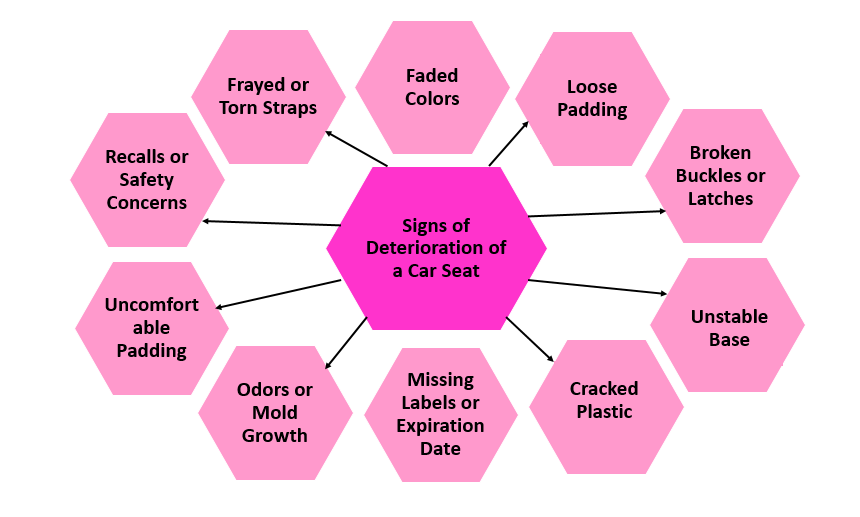
Faded Colors – Baby Car Seats Expire
Keep an eye out for significant color fading on the fabric covering the car seat. This can indicate prolonged exposure to sunlight and general wear and tear.
Frayed or Torn Straps
Check the seat’s harness straps for any signs of fraying, tearing, or significant wear. Damaged straps can compromise the safety of the car seat during an accident.
Loose Padding
Over time, the padding in a car seat may become compressed or worn out, leading to a loss of support and comfort for your child. Give the padding a gentle squeeze to check if it feels loose or flattened.
Broken Buckles or Latches
Ensure that the buckles and latches on the car seat are functioning properly. If they are broken, cracked, or have difficulty securing, it’s a sign of deterioration that requires immediate attention.
Unstable Base
The base of the car seat should remain stable and secure when installed correctly. If you notice excessive wobbling, rocking, or looseness, it could indicate wear in the seat’s attachment points.
Cracked Plastic
Inspect the plastic components of the car seat for any cracks or signs of damage. Cracked plastic can weaken the structure of the seat and compromise its ability to protect your child in the event of a collision.
Missing Labels or Expiration Date
Look for the manufacturer’s label on the car seat, which contains important information such as the model number, manufacturing date, and expiration date. If these labels are missing or unreadable, it’s a sign of age and potential deterioration.
Uncomfortable Padding
Sit your child in the car seat and observe their comfort level. If they appear restless or uncomfortable, it could indicate that the padding has lost its plushness or support, making it less effective in providing a safe and comfortable ride.
Odors or Mold Growth
Unpleasant odors or the presence of mold or mildew are clear indicators of moisture accumulation and potential deterioration. These conditions can compromise the seat’s integrity and pose health risks to your child.
Recalls or Safety Concerns
Stay updated with the latest recalls and safety notices from the car seat manufacturer. If your car seat is affected by a recall or has known safety concerns, it’s crucial to address the issue promptly and follow the manufacturer’s instructions.
Remember, car seat safety is of utmost importance for your child’s well-being during travel. Regularly inspecting your car seat for signs of deterioration ensures that it remains in optimal condition, providing the necessary protection in case of an accident.
Final Verdict – Why Do Baby Car Seats Expire?
In safeguarding our children’s safety, understanding the expiration of baby car seats is paramount. The expiration dates of these essential safety devices are not arbitrary but are rooted in evolving safety standards, the effects of time, technological advancements, product liability, and compatibility with regulations. Although manufacturers aren’t universally required to provide expiration dates, doing so empowers parents to make informed decisions for their child’s safety.
Using an expired car seat goes beyond compromised safety, involving worries about insurance coverage, liability, the possibility of legal infringements, and how others perceive your choices. Although it might not lead to criminal charges, the dangers of utilizing an expired car seat should not be downplayed. These potential consequences highlight the need for vigilance and prompt replacement once a car seat reaches its expiration.
For those considering second-hand car seats, cost-effectiveness and availability are enticing, but unknown histories, wear and tear, and outdated safety standards pose risks. International variations in expiration dates underscore the importance of adhering to regional regulations to meet optimal safety standards.
Recognizing signs of car seat deterioration is crucial.
Faded colours, frayed straps, loose padding, broken buckles, and other indicators necessitate replacement. Keeping a keen eye on these signals ensures your baby’s car seat remains durable.
In the intricate world of baby car seats, knowledge is power. Understanding expiration, recognizing signs of wear, and adhering to regional regulations enable us to navigate the path of parenthood with an unwavering commitment to our children’s safety. As responsible caregivers, let us pledge to keep our precious ones secure by embracing the importance of adhering to expiration dates and making informed choices for their well-being.
Frequently Asked Questions – Why Do Baby Car Seats Expire?
Why do baby car seats have an expiration date?
Baby car seats have expiration dates due to materials degrading over time, evolving safety standards, and technological advances.
What factors contribute to the expiration of baby car seats?
Factors include wear and tear, exposure to sunlight, temperature fluctuations, and changes in safety regulations.
Can I still use a baby car seat after it has expired?
It’s not recommended, as expired seats may not offer adequate protection. Safety is compromised due to weakened materials and outdated features.
How does the passage of time affect the safety of baby car seats?
Over time, materials deteriorate, reducing the seat’s ability to absorb impact and protect the child in a crash.
Do safety regulations change, leading to the expiration of older baby car seat models?
Safety standards evolve, prompting manufacturers to develop seats that meet new requirements. Older seats may need to comply with updated regulations.
